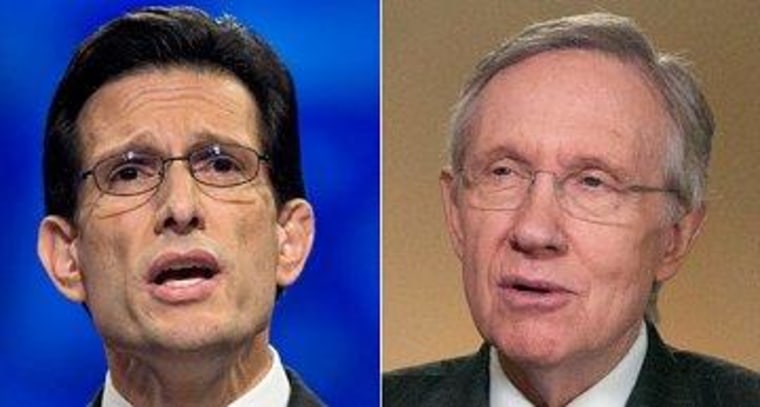For quite a while, the notion that Republican policymakers might be trying to hurt the American economy on purpose was a charge too provocative for Democrats to make out loud. It's one thing to say the GOP's economic ideas are wrong; it's something else to ask whether the GOP is waging a deliberate campaign against the nation's wellbeing.
Slowly but surely, though, it appears Democrats are becoming more comfortable broaching this provocative line.
Senate Majority Leader Harry Reid (D-Nev.), for example, argued last fall, "Republicans think that if the economy improves, it might help President Obama. So they root for the economy to fail and oppose every effort to improve it." This week, in reference to the Paycheck Fairness Act, Reid said, "Unfortunately, it seems Paycheck Fairness may have two strikes against it. It would good for women and good for the economy."
And yesterday, referencing the stalled-but-critically-important highway bill, Reid said, "I'm told by others that [House Majority Leader Eric Cantor] wants to not do a bill to make the economy worse, because he feels that's better for them. I hope that's not true."
Republicans aren't pleased.
"Leader Reid's claims are ridiculous and patently false," said Cantor's spokeswoman Laena Fallon via email. "Rather than making up stories that have no basis in reality, Leader Reid should follow the House's example and focus on pro-growth measures that will get the economy going and get people back to work."Nor was Boehner's office about to let Reid's remark slide. "That's bulls**t," said his spokesman Michael Steel.
Maybe it's time for a larger conversation about this? At a minimum, it's a question quite a few credible observers are asking, whether that infuriates the GOP or not.
Michael Cohen, a fellow at the Century Foundation, apparently following up on a discussion I launched, said last fall, “We’re far past the point where there is reason to doubt that the GOP is purposely trying to harm” the economy.
Sen. Chuck Schumer (D-N.Y.), vice chairman of the Senate Democratic Conference, believes “some” Republicans “want the economy to actually fail” on purpose. Paul Krugman said in a column, “[I]t’s hard to avoid the suspicion that G.O.P. leaders actually want the economy to perform badly.” Eugene Robinson, a Pulitzer Prize winner, was asked whether it’s possible Republicans would sabotage the economy. “Well, let me be honest,” he said. “It has occurred to me that this is a possibility.” E.J. Dionne Jr., Dan Gross, David Frum, and Andrew Sullivan have all raised the same concerns.
A while back, Kevin Drum wondered whether this will ever be “a serious talking point,” adding, “No serious person in a position of real influence really wants to accuse an entire party of cynically trying to tank the economy, after all.”
Given the last couple of years -- the debt-ceiling scandal, the death of the American Jobs Act, the Republican rejection of any proposals to boost the economy, the GOP proposals to take capital out of the economy through dangerous austerity measures, the GOP-driven downgrade, the GOP leadership’s demand that the Federal Reserve take no actions to improve the economy, the threats of government shutdowns -- it appears all kinds of serious people are at least entertaining the question.
I still rather doubt we'll see a broader national discussion about Republicans' motivations and whether sabotage is a legitimate possibility. Even as many on the left broach the subject, they do so carefully, with caveats and qualifiers.
But I wonder what the polls would say if the questions were put to the public, and whether the sabotage issue would have any effect on the 2012 elections.
